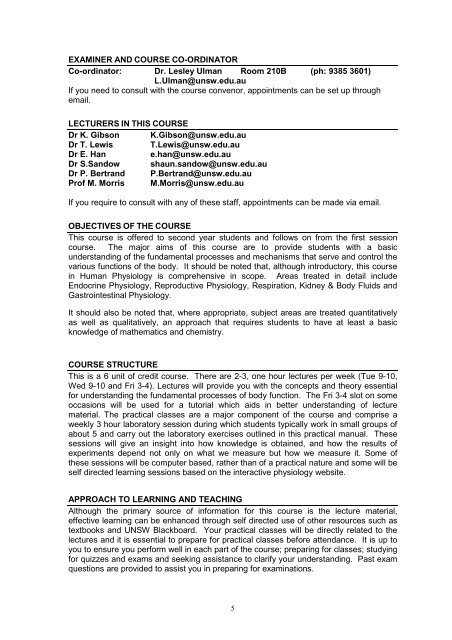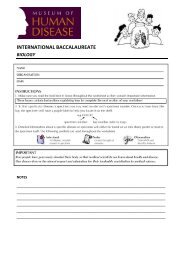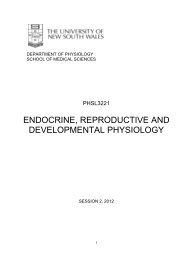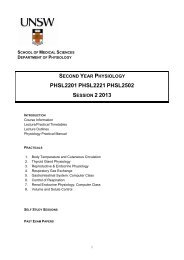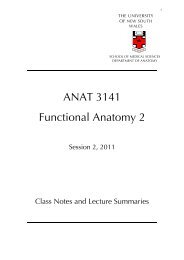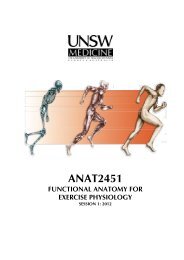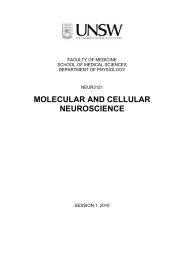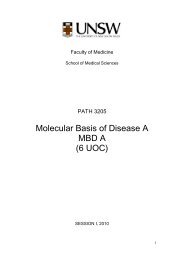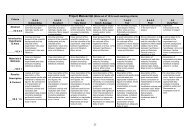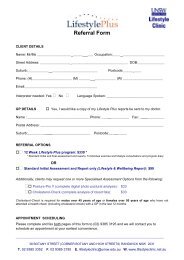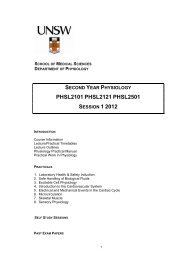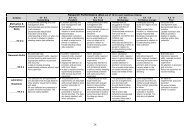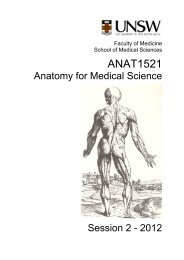PHSL2201 PHSL2221 PHSL2502 - School of Medical Sciences
PHSL2201 PHSL2221 PHSL2502 - School of Medical Sciences
PHSL2201 PHSL2221 PHSL2502 - School of Medical Sciences
Create successful ePaper yourself
Turn your PDF publications into a flip-book with our unique Google optimized e-Paper software.
EXAMINER AND COURSE CO-ORDINATOR<br />
Co-ordinator: Dr. Lesley Ulman Room 210B (ph: 9385 3601)<br />
L.Ulman@unsw.edu.au<br />
If you need to consult with the course convenor, appointments can be set up through<br />
email.<br />
LECTURERS IN THIS COURSE<br />
Dr K. Gibson K.Gibson@unsw.edu.au<br />
Dr T. Lewis T.Lewis@unsw.edu.au<br />
Dr E. Han<br />
e.han@unsw.edu.au<br />
Dr S.Sandow shaun.sandow@unsw.edu.au<br />
Dr P. Bertrand P.Bertrand@unsw.edu.au<br />
Pr<strong>of</strong> M. Morris M.Morris@unsw.edu.au<br />
If you require to consult with any <strong>of</strong> these staff, appointments can be made via email.<br />
OBJECTIVES OF THE COURSE<br />
This course is <strong>of</strong>fered to second year students and follows on from the first session<br />
course. The major aims <strong>of</strong> this course are to provide students with a basic<br />
understanding <strong>of</strong> the fundamental processes and mechanisms that serve and control the<br />
various functions <strong>of</strong> the body. It should be noted that, although introductory, this course<br />
in Human Physiology is comprehensive in scope. Areas treated in detail include<br />
Endocrine Physiology, Reproductive Physiology, Respiration, Kidney & Body Fluids and<br />
Gastrointestinal Physiology.<br />
It should also be noted that, where appropriate, subject areas are treated quantitatively<br />
as well as qualitatively, an approach that requires students to have at least a basic<br />
knowledge <strong>of</strong> mathematics and chemistry.<br />
COURSE STRUCTURE<br />
This is a 6 unit <strong>of</strong> credit course. There are 2-3, one hour lectures per week (Tue 9-10,<br />
Wed 9-10 and Fri 3-4). Lectures will provide you with the concepts and theory essential<br />
for understanding the fundamental processes <strong>of</strong> body function. The Fri 3-4 slot on some<br />
occasions will be used for a tutorial which aids in better understanding <strong>of</strong> lecture<br />
material. The practical classes are a major component <strong>of</strong> the course and comprise a<br />
weekly 3 hour laboratory session during which students typically work in small groups <strong>of</strong><br />
about 5 and carry out the laboratory exercises outlined in this practical manual. These<br />
sessions will give an insight into how knowledge is obtained, and how the results <strong>of</strong><br />
experiments depend not only on what we measure but how we measure it. Some <strong>of</strong><br />
these sessions will be computer based, rather than <strong>of</strong> a practical nature and some will be<br />
self directed learning sessions based on the interactive physiology website.<br />
APPROACH TO LEARNING AND TEACHING<br />
Although the primary source <strong>of</strong> information for this course is the lecture material,<br />
effective learning can be enhanced through self directed use <strong>of</strong> other resources such as<br />
textbooks and UNSW Blackboard. Your practical classes will be directly related to the<br />
lectures and it is essential to prepare for practical classes before attendance. It is up to<br />
you to ensure you perform well in each part <strong>of</strong> the course; preparing for classes; studying<br />
for quizzes and exams and seeking assistance to clarify your understanding. Past exam<br />
questions are provided to assist you in preparing for examinations.<br />
5


